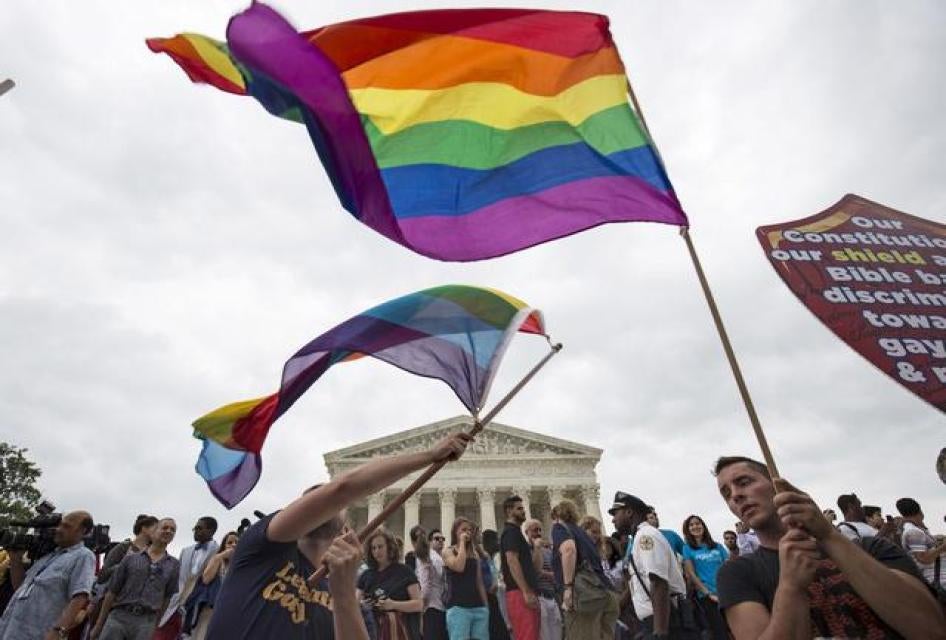(Washington, DC) – The United States Supreme Court decision on June 26, 2015, that the US Constitution grants same-sex couples the right to marry is a landmark win for marriage equality in the US that could foster change around the globe.
“The Supreme Court’s decision is a huge victory for same-sex couples in the US that will reverberate in many countries that still deny people the right to marry the person they love,” said Boris Dittrich, lesbian, gay, bisexual, and transgender (LGBT) rights advocacy director at Human Rights Watch. “It will strengthen everyone’s fundamental rights to equality and non-discrimination, irrespective of sexual orientation or gender identity.”
In the case of Obergefell v. Hodges, the court considered whether the US Constitution requires US states to license two people of the same sex to marry. Justice Anthony Kennedy, writing for the 5 to 4 majority, said that marriage is a fundamental right that all couples are entitled to under the Fourteenth Amendment of the constitution, which provides for equal protection to all citizens under the law. “No union is more profound than marriage, for it embodies the highest ideals of love, fidelity, devotion, sacrifice, and family […] They ask for equal dignity in the eyes of the law. The [US] Constitution grants them that right.” Justice Kennedy said.
The decision comes after a series of important court rulings that have expanded the rights of LGBT people in the US. In June 2003, the court ruled in Lawrence v. Texas that state bans on private, consensual same-sex conduct violated the constitutional right to privacy. In June 2013, the court ruled in United States v. Windsorthat section 3 of the 1996 Defense of Marriage Act, which prohibited any federal recognition of same-sex marriages entered into at the state level, was unconstitutional.
After Windsor, the court had declined to consider appeals of several lower court decisions that found state-level same-sex marriage bans unconstitutional. In November 2014, the US Court of Appeals for the Sixth Circuit, in its decision in Obergefell v. Hodges, upheld state same-sex marriage bans in Ohio, Michigan, Kentucky, and Tennessee. The decision was the first since the Supreme Court’s decision in Windsor in which a federal appeals court had found state same-sex marriage bans constitutional. The Supreme Court’s decision overturns the lower court’s decision, ruling that the bans violated the constitutional right of gays and lesbians to equal protection under the law.
Prior to the ruling, 36 US states and the District of Columbia recognized the legal right to same-sex marriage. In addition to the four state bans that were found unconstitutional in today’s ruling, 10 other states currently retain bans on same-sex marriage. It is unclear when states retaining same-sex marriage bans will comply with the Supreme Court’s ruling and begin issuing marriage licenses to same-sex couples.
In March, Human Rights Watch submitted an amicus (“friend of the court”) brief along with the New York City Bar Association and several nongovernmental organizations based in other countries. The brief asked the court to consider policies in countries such as Argentina, Canada, the Netherlands, New Zealand, and South Africa, which provide marriage licenses or similar regulatory permission to people of the same sex to marry. In establishing these policies, the governments and courts of these countries weighed legal and constitutional questions similar to those addressed by the US Supreme Court.
Other countries have followed suit. Same-sex marriage is now legal in Argentina, Belgium, Brazil, Canada, Denmark, France, Iceland, Ireland, Luxembourg, the Netherlands, New Zealand, Norway, Portugal, South Africa, Spain, Sweden, the United Kingdom, and Uruguay, as well as in parts of Mexico. In May, voters in Ireland overwhelmingly approved a referendum enshrining the right to marriage equality in the country’s constitution. The law is expected to come into effect later this year.
Dittrich initiated the debate on marriage equality as a member of the Dutch Parliament in 1994. After heated debates in parliament and in society at large, parliament approved same-sex marriage legislation in 2001, making the Netherlands the first country in the world to legally recognize same-sex marriage.
“The court’s decision is a joyous occasion for same-sex couples in the US and their families,” Dittrich said. “State legislators should act quickly to repeal state same-sex marriage bans and ensure that all constituents are able to freely exercise their constitutional right to marriage equality.”






